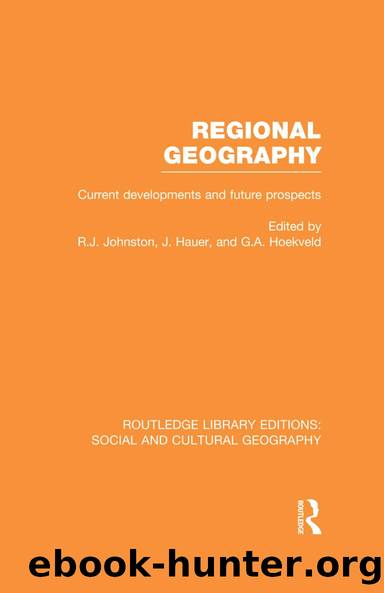Regional Geography (RLE Social Cultural Geography) by Ron Johnston Joost Hauer G. Hoekveld

Author:Ron Johnston, Joost Hauer, G. Hoekveld [Ron Johnston, Joost Hauer, G. Hoekveld]
Language: eng
Format: epub
Tags: Nonfiction, Social & Cultural Studies, Social Science, Human Geography
ISBN: 9781317820604
Publisher: Taylor and Francis
Published: 2014-01-23T05:00:00+00:00
Geography as life support?
Geographers have long argued that the incorporation of space into aspatial social theory undermines many â if not all â of the central assumptions of that theory. This view has been expressed most recently in a particularly dramatic way by David Harvey:
The insertion of concepts of space and space relations, of place, locale, and milieu into any of the various supposedly powerful but spaceless social and theoretic formulations has the awkward habit of paralysing that theoryâs central propositions.
This condition is so debilitating that:
Whenever social theorists actively interrogate the meaning of geographical and spatial categories, either they are forced to so many ad hoc adjustments that their theory splinters into incoherency or they are forced to rework very basic propositions.
(Harvey 1985a:xiii)
The implication here is that geography matters, in that it shatters any attempt to understand society in geographical terms. All social theory must be geographical theory because geography shapes human affairs. It is impossible to conceive of social processes which are not socio-geographic processes. So historical materialism, for example, must become historical-geographical materialism.
But this conclusion and what might follow from it are not fully spelled out â at least in my reading of Harvey â and he devotes more attention to the (related) question of the relationship between theory and experience. In short, Harvey, when writing about the practice of social life, reveals an uncertainty about the significance of geography, which is obscured in his more conceptual statements by an apparent confidence in its central importance. Nevertheless, Harvey does suggest that it is not enough merely to consider capitalism in space. The questions of the production of space â âhow capitalism creates a physical landscape ⦠in its own imageâ4 which then affects the dynamics of the circulation of capital â and âthe implications for political consciousness of such processesâ form the more ambitious agenda that is explored in his two-volume âhistorical geography of capitalismâ (Harvey 1985a:xvii, xviii; 1985c).
The notion of the production of space is also taken up by Neil Smith (1986). Space is endowed with significance not because of any intrinsic ontological property but, he argues, because it is the product of socio-economic processes. It is not a âdead âfactorâ but comes alive neither as a separate thing, field nor container but as an integral creation of the material relations of societyâ (Smith 1986:92).5 Now, in an argument designed specifically to rebut âSpace blind reductionismâ (p. 94), this is a curious claim. It puts space in its place, integral to but dependent upon material relations. Nevertheless, âthe role of geographical spaceâ (p.88) remains important. Smith suggests that the âmix of geographically expanded equalization and sharpened differentiationâ during the world economic crisis ârepresents the real solution adopted by capitalâ to the dilemma faced by a capitalism with no more pre-capitalist societies to penetrate. So Smithâs space, like Harveyâs, is active in presenting alternatives and (temporary) solutions to capitalist crisis. He argues that the âtransformation in the definition of developed and underdeveloped areasâ and the âhardened geography of
Download
This site does not store any files on its server. We only index and link to content provided by other sites. Please contact the content providers to delete copyright contents if any and email us, we'll remove relevant links or contents immediately.
Man-made Catastrophes and Risk Information Concealment by Dmitry Chernov & Didier Sornette(6005)
The Revenge of Geography: What the Map Tells Us About Coming Conflicts and the Battle Against Fate by Kaplan Robert D(4066)
Zero Waste Home by Bea Johnson(3833)
COSMOS by Carl Sagan(3617)
Good by S. Walden(3548)
In a Sunburned Country by Bill Bryson(3536)
The Fate of Rome: Climate, Disease, and the End of an Empire (The Princeton History of the Ancient World) by Kyle Harper(3055)
A Wilder Time by William E. Glassley(2858)
Camino Island by John Grisham(2794)
Organic Mushroom Farming and Mycoremediation by Tradd Cotter(2688)
The Ogre by Doug Scott(2679)
Human Dynamics Research in Smart and Connected Communities by Shih-Lung Shaw & Daniel Sui(2500)
Energy Myths and Realities by Vaclav Smil(2487)
The Traveler's Gift by Andy Andrews(2457)
9781803241661-PYTHON FOR ARCGIS PRO by Unknown(2365)
Inside the Middle East by Avi Melamed(2349)
Birds of New Guinea by Pratt Thane K.; Beehler Bruce M.; Anderton John C(2249)
A History of Warfare by John Keegan(2239)
And the Band Played On by Randy Shilts(2197)
